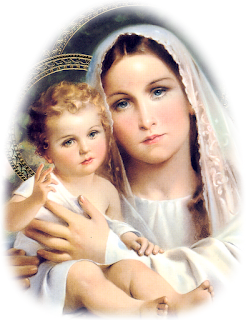Holy Angels Pray for us! Useful article by Pat Bartos
"
| "ANGELS WITH NAMES |
| Pat BartosSource: http://www.ewtn.com/library/MARY/ANGNAME.htm |
| Michael, Gabriel and Raphael are the only angels to have come down through the ages with names and strongly defined imagesInvisible beings of light, carrying out God's will among mankind, angels cries-cross through the stories in Scripture. The Bible is filled with these mysterious, anonymous presences. St. Gregory the Great said that "almost all the pages of the sacred books bear witness to the existence of angels and archangels." They are so numerous that God is known as "Lord of hosts." Yet just three have come down through the ages with names and with strongly defined images, assumed through their roles in carrying out God's mandates. Archangels Michael, Gabriel and Raphael—all of their names ending in "el," a Semitic name of God—are accorded a special liturgical feast day, celebrated on Sept. 29 each year. Michael, the fearless warrior, Gabriel, the angel of the Incarnation, and Raphael, known as the angel of prayer, were joined together liturgically just 25 years ago from their separate feasts and given the date, which for centuries had honored Michael alone. Venerated since ancient times, Michael is known in the Old Testament as the "Guardian of the Hebrew Nation," and by other titles, "Viceroy of Heaven," and "Prince of the Heavenly Hosts." He stands as the most prominent of the three. His name translates as "Who is like God?" and his image of bravery traces to the text in Revelation where he leads the angels in heaven in battle to oust the seven-headed dragon. He has long been synonymous with defending the Church. Defined by his heroism and unquestioning faithfulness to God Michael is thought to be the angel who guided the Jews on their wanderings in the desert, and the angel who fought with Satan over the soul of Moses. The Emperor Constantine attributed his victories in battle to Michael, as did Joan of Arc who also credited her vocation to him. It was St. Augustine who devised the concepts of honor and love as the proper approach to venerating angels, and the earliest devotions to angels centered on Michael. Medieval knights often consecrated themselves to him, and devotions in his honor play prominent roles in many countries. He was the sole angel honored in liturgical feasts in the Church before the ninth century. In Eastern tradition, this devotion traces back to the fourth century. In the East, Michael is depicted in art in imperial purple, in the West, in a long tunic or the armor of a medieval knight. He appears in scenes of the Last Judgment battling the dragon or the forces of Satan. He has often been depicted in literature, and Milton in "Paradise Lost" predicts Michael will blow the trumpet, announcing the Final Judgment. Both Gabriel and Raphael appeared in Scripture in the guise of human form, speaking audible words. Gabriel (whose name translates as "God's fortitude" or "God is powerful") is depicted as the angel of the Incarnation, for his joyful announcements to Mary and to Zacharias foretelling the births of Christ and John the Baptist. He is also thought to be the angel who announced Christ's birth to the shepherds in Bethlehem. Appearing to Zechariah as the priest is offering incense in the temple, he announces, "I am Gabriel, who stands in the presence of God. And I was sent to speak to you and to bring you this good news." His profound greeting to Mary lives on, repeated daily in popular prayer. "Hail Mary! Full of grace, the Lord is with you. Blessed are you among women." Gabriel had appeared to a troubled Daniel some 500 years earlier, in the Old Testament. As Daniel's prayer ascends, one biblical scholar explained, the angel descends. Gabriel, "in rapid flight," touched Daniel and explained his vision. Each of his four appearances in Scripture deals with the coming of the Messiah. He is depicted in a fifth-century mosaic of the Annunciation at St. Mary Major in Rome, in what is the oldest known illustration of an angel with feet and two wings. In Jewish lore, he foretold the birth of Samson. In Islam, he dictated the Koran to Mohammed. Gabriel is the patron of workers in communications. Raphael is called the angel of prayer by Tertullian because of his words to Tobias: "I have offered your prayers to God." His name means "medicine of God," or "God heals," and he is called upon to aid travelers and members of the medical profession. He is said by scholars to embody the ability of angels to intervene in the affairs of mankind while never ceasing to contemplate the face of God in heaven, and is thus seen as a model for the integration of the outward and interior life. "How can I repay him?" Tobias asks his father Tobit in the Old Testament, after he returns from his long journey, on which he had unknowingly been accompanied by Raphael, disguised in human form as Azarias ("God helps"). This companion, Tobias explains, "...led me back to you safely, he cured my wife, he obtained the money for me from Raphael, filled my parents with joy. He protected me from the fish that was going to eat me, he has healed your blindness, how could I possibly repay him?" The Book of Tobit is seen as depicting life as a journey and reflecting God's design to help mankind. Veneration for Raphael has been infrequent, and the earliest church honoring him dates to the 7th century. He is depicted in art works as walking with Tobias, accompanied by a small dog and carrying a fish. Raphael is regarded as the patron of light, love, health and joy." |

Comments
Post a Comment